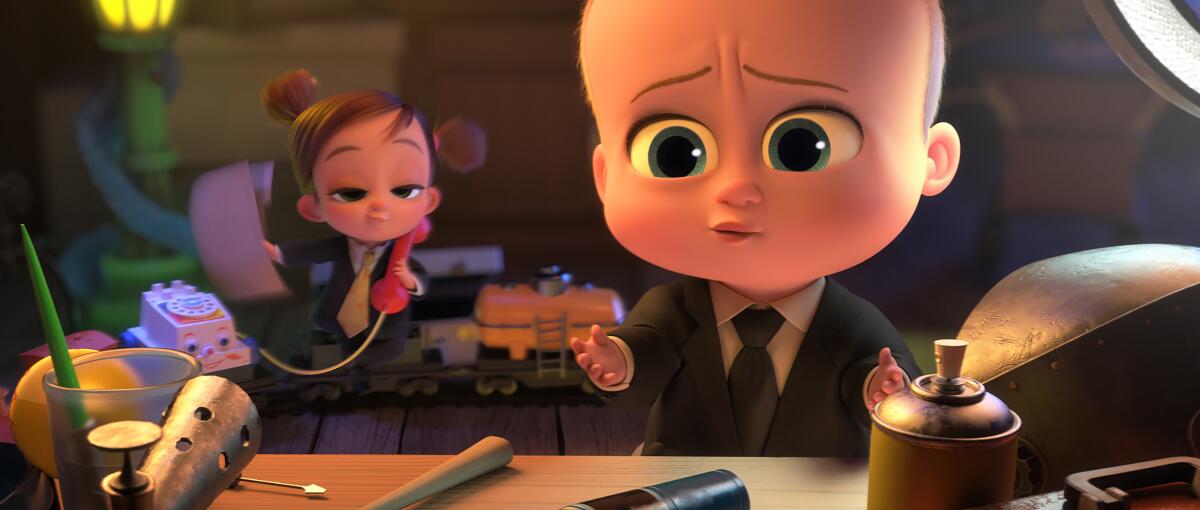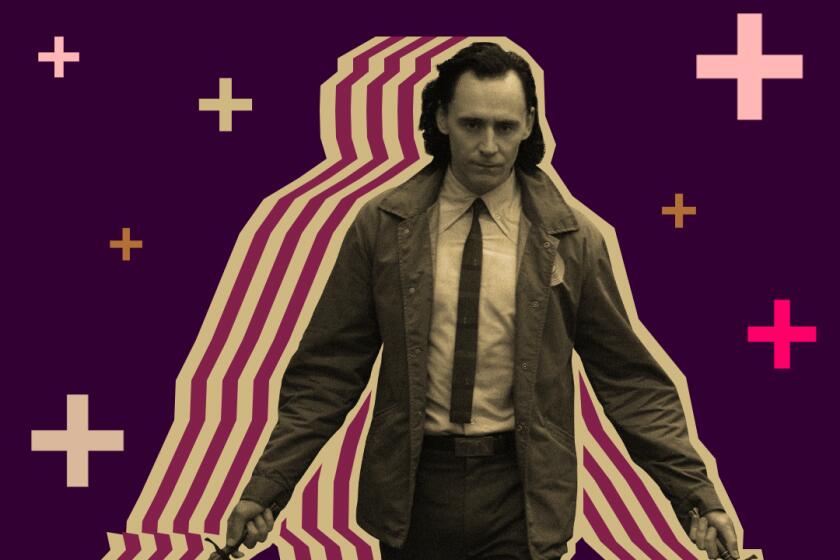Universal movies will go to Peacock instead of HBO. But there’s a big catch

The studio behind just-released sequel “The Boss Baby” and the next “Jurassic World” has created a new hybrid output deal for streaming and pay TV.
Movies from Comcast Corp.’s Universal Pictures will go to its sister streaming service Peacock after their theatrical and home video releases, ending a longtime pact with HBO, as the company looks to compete with media industry rivals in online video.
Inside the business of entertainment
The Wide Shot brings you news, analysis and insights on everything from streaming wars to production — and what it all means for the future.
You may occasionally receive promotional content from the Los Angeles Times.
Universal on Tuesday said it signed an unusual multiyear deal to distribute films to Peacock “no later than” four months after they’re released in theaters, starting in 2022. That’s much shorter than the typical six- to nine-month gap between a movie’s debut in multiplexes and when it hits pay TV networks.
The move officially ends a longtime deal with HBO that was most recently renewed in 2013. The new plan lasts five years, according to a person familiar with the matter who was not authorized to comment.
But while Universal had long been expected to abandon its HBO relationship in favor of growing Peacock, the new arrangement differs significantly from the usual output agreement.
In a typical agreement, known as a “Pay 1” deal, studios license their films to a cable network or streaming service — such as Netflix or HBO — for an 18-month window.
The streaming service, which was already available to Comcast customers, could struggle without Roku and Amazon partnerships. But Peacock’s strategy is different.
In a twist, though, Peacock will have the rights to stream Universal movies for the first four months. After that, the movies will go to another yet-to-be-named third-party network for 10 months. The films subsequently will return to Peacock for the remaining four months.
Financial details were not disclosed.
The deal comes as NBCUniversal is trying to buoy Peacock, which launched almost a year ago amid the COVID-19 pandemic. Peacock offers a free version, a $5-a-month “premium” tier and a $10 option without advertising. Comcast recently said Peacock had 42 million sign-ups but did not disclose how many were paying.
Film output deals are typically worth $200 million to $300 million a year in licensing revenue for Hollywood studios.
But recently, many media companies have chosen to pull their content from rival networks and Netflix in order to supply their own services.
Universal’s Peacock deal allows NBCUniversal to use movies to draw viewers to its streaming service without completely sacrificing the money it makes by licensing its pictures.
Comcast has not been as aggressive as competitors including Disney, Netflix and WarnerMedia when it comes to putting exclusive original content on its service. It has so far been counting on programming such as “The Office” and sporting events including the Olympics and WWE to entice users, while releasing some originals such as the comedy “Girls5eva.”
Are streaming services ‘building love’ for their franchises, or are they ‘driving addiction’?
Movies have so far not been a big part of Peacock’s offering, though the studio did release DreamWorks Animation’s “The Boss Baby: Family Business” simultaneously on Peacock and in theaters. The company did not say how many people watched the animated sequel on Peacock. It opened with an estimated $20 million during the July 4 weekend.
The Universal deal will give film a bigger presence on Peacock by bringing movies such as “Jurassic World: Dominion,” a new Jordan Peele film, DreamWorks Animation’s “Puss in Boots: The Last Wish” and Illumination Entertainment’s “Minions: The Rise of Gru” to the service.
Universal also will produce an undisclosed number of original movies for Peacock.
Peter Levinsohn, chief distribution officer of Universal Filmed Entertainment Group, said in a statement that the deal “allows filmmakers and artists to reach the broadest possible audience, celebrates and strengthens the theatrical experience, and, above all, empowers fans to experience the films they love on their own terms.”
The pact leaves HBO without one of its major suppliers as WarnerMedia attempts to accelerate the growth of HBO Max. HBO gets movies from its sister studio, Warner Bros., as well as 20th Century Studios, formerly known as 20th Century Fox, which is now owned by Disney. Fox’s deal with HBO is set to expire at the end of 2022.
WarnerMedia shook up the movie business by premiering all of its 2021 films simultaneously on HBO Max and in theaters.
Warner Bros. angered Hollywood with its decision to put movies in theaters and on streaming service HBO Max simultaneously. It now faces a turning point as the studio’s parent company prepares its film strategy for the streaming age. In the background, a new owner: Discovery.
The Universal agreement with Peacock is the latest example of how streaming has changed TV deals for movies. Sony Pictures, which does not have a major in-house streaming service, earlier this year signed a five-year agreement to supply its theatrical movies to Netflix. The Culver City studio previously had a deal with Starz. Sony also will produce a handful of original films for Netflix.
Sony later announced it had signed a wide-ranging second output deal with Disney for streaming and its TV networks.
Universal has released multiple movies exclusively in theaters during the pandemic through an agreement with exhibitors to allow early $20 rentals online. The latest “Fast & Furious” movie, “F9: The Fast Saga,” has grossed more than $500 million globally.
Times staff writer Meg James contributed to this report.
More to Read
Inside the business of entertainment
The Wide Shot brings you news, analysis and insights on everything from streaming wars to production — and what it all means for the future.
You may occasionally receive promotional content from the Los Angeles Times.













